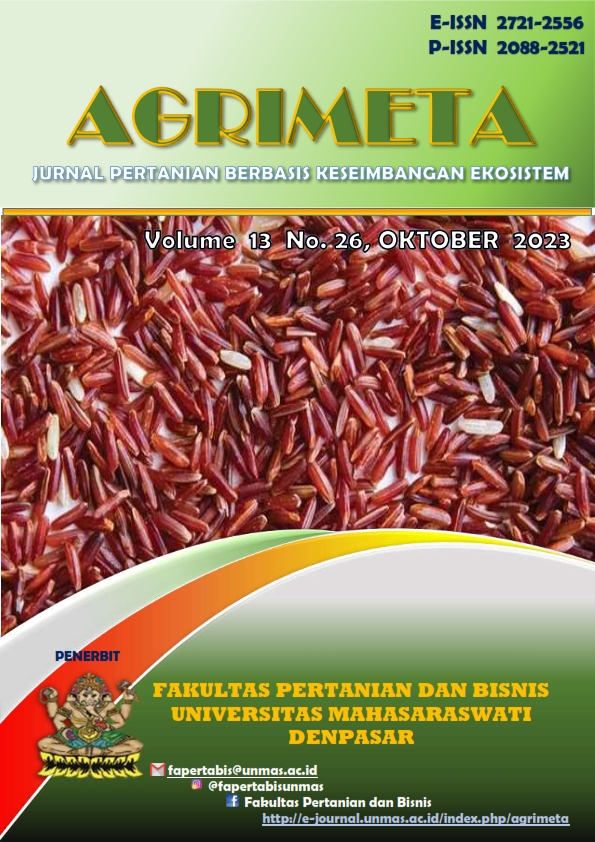Keuntungan Usahatani Bawang Merah di Desa Bengkel Kecamatan Kediri Kebupaten Tabanan
Keywords:
Shallot, Farming, profitsAbstract
This Research is entitled” The Benefits OF Shallot Farming”in Bengkel Village, Kediri District, Tabanan Regency.This Study aims to (i) Analyze the total cost of Shallot Farming. (ii) To analyze The cost of shallot Farming, (iii) The analyze the Profits of Shallots Farming in The Kediri, Kediri District, Tabanan Regency. Determation in this study amounted to 30 people. The method of data alalysis in this study can be obtained bu calcaluting the total cost, calculating revenue, calculating profits. The results Showed (1) The local cost The results showed (1) the total cost of cultivating Shallots from Bengkel was Rp. 56,343,110 per season per 54.5 acres of planted land (2) the average production of Shallots in Bengkel village was 4700 kg per 54.5 acres of land, so that the productivity of Shallot farming is 8,264 tons in the form of wet Shallots that are clean from soil dirt and the profits of Shallot farming in Bengkel Village are IDR 42 354 790 seasons per land area of 54.5 acres, with a fairly high level of farming risk
However, it can be suggested by farmers to be more intensive in managing the shallot business, considering that its productivity is still low (8,264 tonsha) while the productivity of red onions in Bali can reach 15 tons/ha. Pesticides like Demolish and Antracol are used quite intensively which can have an impact on biodiversity and sustainability of Shallot farming, so efforts are made to use a combination of organic pesticides and integrated control.
Downloads
References
Arikunto, S. 2008. Prosedur Penelitian Suatu Pendekatan Prakter. Jakarta: Bineka Cipta
Ashari, S. 2005. Hortikultura Aspek Budidaya. Jakarta: UI Press
Bambang, S 1994. Analisis Laporan Keuangan, LP3E-Jakarta
Firdaus, Muhammad. 2008. Manajemen Agribisnis. Jakarta: Bumi Aksara
Herawati, W.D. 2012. Budidaya Sayuran. Jakarta: Javalitera
Hermanto, F. 1989. Ilmu Usahatani. Jakarta: Penebar Swadaya.
Kartika. 2007. Kajian Tingkat Produksi dan Pendapatan Usahatani Sayuran
Prawirokusumo, Soeharto. 2009. Ilmu Usahatani. Yogyakarta: BPFE. 174 hal.
Prihatman, Kemal. 2000. Tentang Budidaya Pertanian Rambutan (NepheliumLappeceum). Jakarta: Kantor Deputi Menegristek Bissdang Penyadagunaandan Permasyarakatan Ilmu Pengetahuan dan Teknologi
Rahayu, E, dan Berlian, N. V. 1999. Pedoman Bertanam Bawang Merah. Penebar Swadaya, Jakarta.






